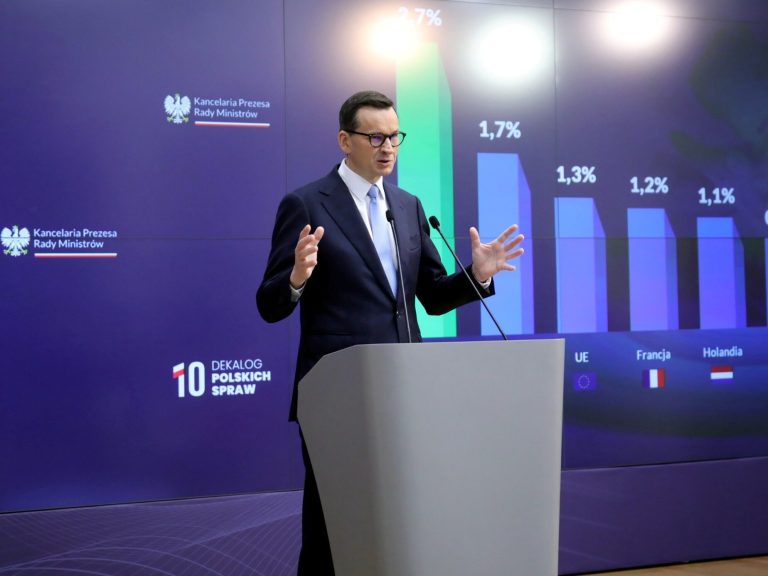Small and medium-sized companies – a pillar of the Polish economy
Not corporations, but micro, small and medium-sized entrepreneurs are responsible for the economic development that Poland has experienced for three decades. They create jobs, provide services, and when the economic situation changes, they can adapt quite flexibly to new conditions. This does not mean that the life of entrepreneurs is a bed of roses.
The number of active enterprises in our country is constantly increasing. Between 2009 and 2020, their number increased by 35 percent! Micro, small and medium-sized enterprises constitute as much as 99.8 percent. all companies active in Poland.
Although many people automatically think of multinational corporations in the context of entrepreneurship, in fact in 2022 they accounted for only 0.2 percent. entities active on the market.
The Polish economy relies on micro-entrepreneurs
Valuable information about micro, small and medium-sized enterprises is provided by the “Report on the state of the SME sector in Poland 2022” prepared by PFR Group analysts. We learn from it that the largest group of SMEs (97%; 2.2 million) are micro-enterprises, i.e. entities that employ on average less than 10 employees per year under employment contracts. The share of small companies in the structure of Polish enterprises is 2.2%. (49.5 thousand) and medium-sized ones – 0.6 percent (14.4 thousand).
Polish SMEs operate primarily in services and trade (74.6%), and less often in construction and industry. The specificity of the Polish SME sector is that as many as 87.2 percent all entrepreneurs are natural persons running a business.
It is no exaggeration to say that companies from the SME sector are the foundation of the Polish economy. When we compare the data, it turns out that the share of SMEs in generating GDP is constantly growing: small and medium-sized companies generate almost half of Polish GDP, and the smallest companies, i.e. micro companies, generate almost 30%.
What happens in enterprises: whether they are ready to invest, increase employment, enter new markets – determines the direction in which the economy will develop. Large enterprises rely to a large extent on the activities of smaller ones: on the one hand, they commission services and subcontracts to them, and on the other hand, they sell their services and goods to them. So if micro, small and medium-sized enterprises run out of breath, corporations will too, over time – unless they find some other financing, for example from the countries where their headquarters are located. However, this indicates an irregularity: the market is a set of communicating vessels and all elements must function efficiently so that everyone benefits.
Sometimes a little can do more
SMEs are a kind of stimulator of economic development, and the level of their development and ability to conquer the market is one of the measures of this development. In a properly functioning market economy, this sector plays a complementary role not only to large companies, as we have already mentioned, but also to the public sector. SME companies participate in tenders, execute contracts, and provide goods and services that public entities cannot provide. They can perform certain activities more efficiently.
A real-life example is dental offices – the vast majority of Poles have their teeth treated in private offices, although this requires higher fees than in a public facility, so it is not an offer for everyone. Services provided by offices cooperating with the National Health Fund are complemented by offices run by dentists providing commercial services, which allows each patient to choose an offer that meets his expectations and financial possibilities. It is better not to think what would happen if treatment could not be provided in the private sector.
In many ways, SMEs are very flexible. These are relatively small (or really very small) structures that respond to market changes on an ongoing basis. They have no management boards or supervisory boards, so they can make quick decisions to adapt to changing conditions. Is the product selling poorly? They reduce production. Is employment in some departments too high? They are trying to redirect several employees to another location. Conducting quick recruitment is also not a problem.
Entrepreneurs who can read signals and anticipate the development of events can manage their activities appropriately and avoid many strandings.
This does not mean that the life of a small business entrepreneur is a bed of roses: they complain about high employment costs, frequent inspections and high financial penalties even for minor offenses, and complicated regulations, but they still have flexibility, which is much harder to find in corporations. Whoever knows how to use it can outdo even a large competitor.
Small and medium-sized companies are changing the landscape of regions
The small and medium-sized enterprise sector actively participates in changes in the industrial structure of regions and even the country. Just look at Upper Silesia, which was home to mines and steelworks for several centuries, and for 30 years heavy industry has been giving way to other areas of business activity. The Upper Silesian agglomeration has the ambition to become the Polish center of new technologies. Laboratories, headquarters of companies dealing in broadly understood IT, technological start-ups are being established there, and work is being done on obtaining green energy. Of course, large foreign and Polish capital is active there, i.e. corporations and large companies, but there are also small ones. They complement each other, cooperate and provide mutual services.
Private companies began to appear in Upper Silesia in the 1990s, when the first mines were closed and some miners used the severance pay they received in connection with leaving the mine to run their own businesses. Initially, they were small entities: someone started a car repair shop, someone else started a shop. Over time, these small companies, which were supposed to be a way to survive the difficult period, developed, merged, took over weaker competition, and this led to a situation in which there are over two thousand IT-related companies operating in the Silesian Voivodeship.
The Katowice agglomeration is already one of the most important centers in the modern business services sector. In terms of employment, it ranks fifth in Poland and tenth in Central and Eastern Europe. The voivodeship also ranks second in terms of the number of registered entities (after Masovia). There would not be such a spectacular result if it were not for the activity of small entrepreneurs.
A business account allows you to simplify many activities
The daily functioning of micro, small and medium-sized entrepreneurs is not easy. They complain about the costs of running a business (taxes, contributions, remuneration for an accountant who can settle everything so that the tax office does not have any objections) and the changing law. To make their everyday activities easier, they can use products and services that have been designed especially for them. These include banking services designed for SMEs. Such bank accounts are distinguished not only by their name, but also by embedded benefits that are not available to non-entrepreneur customers.
One of such services is, for example, iKonto Biznes with a Plus card at Alior Bank. When the account is opened, the bank transfers PLN 400 to it (the condition is to enter the PROMO400 password during registration). Entrepreneurs receive a bonus of up to PLN 1,500 for regular use of online banking, and up to PLN 1,000 in fuel refunds for using the card at gas stations. Entrepreneurs will also gain free access to an accounting application, where they can obtain expert advice, create an online business card, and calculate the creditworthiness of their company using a special calculator.
iKonto Biznes became the leader of the ranking of business accounts on the Comperia.pl portal in August 2023 in the category of accounts for micro-enterprises. Such a special account – enriched with additional services for entrepreneurs – really helps with everyday settlements.






